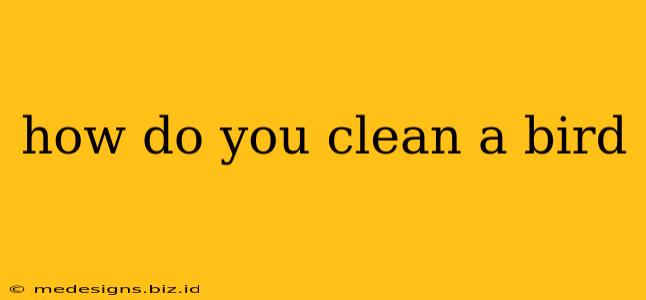Cleaning a bird, whether it's a pet parrot or a wild bird you've found injured, requires a delicate approach. This guide explores different cleaning scenarios and emphasizes the importance of safety and proper techniques. Never attempt to clean a bird unless you're experienced or have expert guidance. Improper cleaning can cause serious harm or even death.
Cleaning Pet Birds: Maintaining a Healthy Environment
Keeping your pet bird clean and healthy involves several key aspects:
1. Daily Cleaning: Preventing Build-up
- Cage Cleaning: Daily spot cleaning is crucial. Remove droppings, soiled food, and any debris from the cage floor and perches. Use paper towels or appropriate cage liners for easy disposal.
- Food and Water Dishes: Wash food and water dishes daily with warm, soapy water. Rinse thoroughly to eliminate any soap residue.
- Toys: Clean or replace soiled toys regularly to prevent bacterial growth. Many bird toys are safe to wash in a dishwasher or by hand washing them with bird-safe detergent.
2. Weekly Deep Cleaning: A Thorough Approach
- Cage Disinfection: Once a week, thoroughly clean the entire cage using a bird-safe disinfectant. Rinse meticulously to ensure no residue remains. Avoid harsh chemicals.
- Perches and Accessories: Wash perches and other accessories with warm, soapy water. Allow them to completely dry before returning them to the cage.
- Bathing: Most pet birds enjoy a bath. Offer a shallow dish of water or gently mist them with lukewarm water. Ensure the water is not too cold or too hot.
3. Specialized Cleaning Tasks: Addressing Specific Needs
- Feather Cleaning: Avoid forcibly cleaning your bird's feathers. Instead, focus on providing opportunities for natural preening.
- Beaks and Claws: Trim overgrown beaks and claws with specialized avian clippers. If unsure, seek professional help from an avian veterinarian.
- Specialized Cleaning Products: Utilize only products specifically designed for avian use. These are formulated to avoid harming your bird.
Cleaning Wild Birds: Handling with Extreme Care
Important Note: Handling wild birds should only be done by experienced wildlife rehabilitators. Improper handling can cause stress, injury, and disease transmission. If you find an injured wild bird, contact your local wildlife rehabilitation center immediately.
If you must temporarily care for an injured bird before professional help arrives:
- Minimize Handling: Keep handling to an absolute minimum. Use gloves if possible.
- Focus on warmth and shelter: Provide a safe, warm, and quiet space for the bird.
- Avoid Cleaning: Do not attempt to clean the bird unless it is severely soiled with mud or oil. Consult a professional for guidance.
Choosing the Right Cleaning Supplies
- Bird-Safe Disinfectants: Choose disinfectants specifically formulated for use with birds. Avoid products containing harsh chemicals or strong fragrances.
- Mild Soap: Use a mild, unscented dish soap to clean food and water dishes and cage accessories.
- Paper Towels: Paper towels are convenient for daily spot cleaning.
- Cage Liners: Use absorbent cage liners that can be easily replaced.
Preventing Illness Through Cleanliness
Regular cleaning is paramount in preventing various avian illnesses. A clean environment minimizes the risk of bacterial and fungal infections, reducing stress and promoting overall bird health. Consistent attention to hygiene is an investment in your bird’s well-being. Remember, if you're unsure about any aspect of bird cleaning, consult an avian veterinarian for personalized advice. Their expertise will ensure your feathered friend remains healthy and happy.
